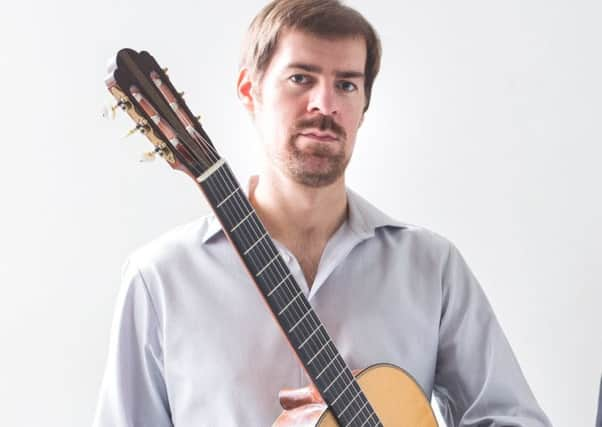Interview: guitarist Simon Thacker on blending Indian, Flemenco and Balkan influences on his new album


“Alchemy,” says Thacker, “is about transforming not just physical elements – gold out of lead or whatever in the Middle Ages – but a philosophical or spiritual seeking. That’s the concept behind Karmana: where do these magical sounds come from? How can they sometimes affect you so profoundly that your whole understanding of music and perhaps of life is transformed?”
The Indian, Flamenco and even Balkan influences which deeply inform Thacker’s work are evident here, although the album is not as overtly Indian as his last album, Rakshasa, recorded with his Svara-Kanti ensemble. Karmana’s first movement opens with a microtonal curling of cello before Thacker’s more Iberian-sounding guitar comes in, signalling a wild dance between the two instruments. The second movement, Albedo (another alchemical reference), is a languorous Indo-Flamenco meditation for solo guitar.
Advertisement
Hide AdAdvertisement
Hide AdThe most overtly Indian expression on the album is Aruna, in which he and Jablonska are joined by Sabri on tabla, while elsewhere they are reunited with Natanson (with whom Thacker performed on the Fringe last summer).
For Thacker, however, perhaps the most important aspect of the album is his first arrangements of Scottish music, most spectacularly his re-imagining of Ruaigidh Dorchadas – collected and re-written by Robert Burns as The Highland Widow’s Lament, mourning a clansman killed at Culloden. To express the song’s historical and emotional turbulence, Thacker redeployed the “backwards guitar” technique, with its echoes of Hendrix and the Beatles, he first used on Rakshasa. On this occasion, however, he painstakingly worked, initially with basic software at home, layering guitars (as many as 25 times) and cellos, as well as threading in birdsong and other natural sounds, before taking it into producer Stuart Hamilton at Castle Sound, whom Thacker credits with turning his rough, disconcerting-sounding demo into a high quality production. Over this darkly buzzing and muttering sound world, Polwart sings the lament with poignant clarity, the whole ending with a sinister cackle of massing crows.
For the Polish-born, classically trained Jablonska, working with Thacker over the past four years has, she says, propelled her forcibly out of her comfort zone: “I basically had to deconstruct my way of thinking about music. It wasn’t just the novelty of the sound worlds we were creating, but the technical challenges as well, in learning so many challenging pieces.”
Clearly, they won’t be performing a studio creation like Highland Widow’s Lament on stage, but hope to tour with other Karmana material later in the year. Thacker is currently working to finish the next Svara-Kanti album and he and Jablonska will appear with that group at the Glad Café, Glasgow, on 25 March and at Edinburgh’s Summerhall on the 26th.
Another artist not to be conveniently pigeonholed is the multi-award-winning, Dundee-born poet Don Paterson, who leads a parallel existence as a jazz guitarist and is currently touring with acclaimed saxophonist Tim Garland, his former partner in the Celtic jazz outfit Lammas, which broke up in 2000. Playing with another fine musician, keyboard player Steve Hamilton, they appear at the Byre theatre, St Andrews, on Saturday, 25 February, and at Glasgow’s Tron Theatre on the 26th. ■
simonthacker.com; timgarland.com